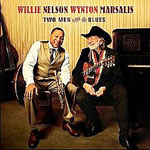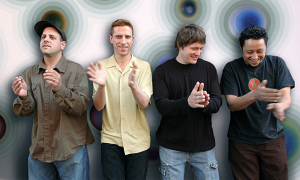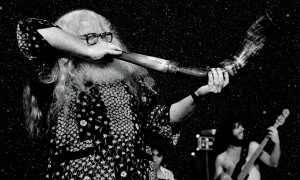Home » Jazz Articles » From the Inside Out » Dynamite Duos and Perfect Partners
Dynamite Duos and Perfect Partners
 Joe Beck & John Abercrombie
Joe Beck & John Abercrombie Coincidence
Whaling City Sound
2007
This duet album is a guitarist's dream. Both Beck and Abercrombie have unquestionable individual virtuosity plus experience in this format through previous tandem performances with Larry Coryell, John Scofield, Ralph Towner and similar luminaries. Together, they explore pillars from the traditional and more exploratory jazz canons including "Things Ain't What They Used to Be" (Mercer/Ellington), "All Blues" (Miles Davis) and "The Turnaround" (Ornette Coleman), plus new originals for the occasion, in witty and bright conversation.
The interwoven riffs and rhythms of the opening "Beautiful Love" serve as both description and introduction. Its sharp yet soft accompaniment shimmers and pulses beneath the fluid and elegantly melodic leads, and it quickly proves impossible to distinguish which guitarist is playing what. Taken at a comfortable pace, "I Should Care" sounds more than familiar to these two masters -it sounds like a recorded master class. The meditative "How Deep is the Ocean" rushes past a little more quickly, and bounces colorfully upon its rhythmic waves.
In Beck's "Mikey Likes It," background guitar hammers down a muted electric blues riff -think of ZZTop's rump-thumping classic "Tush" in the gentler hands of Pat Metheny -while lead guitar briskly inspects every corner of the tune. Davis' "All Blues" becomes its companion piece, with an opening that sings the melody in a genuine trumpet voice, before electric barbed hooks and ejaculations nimbly rumble through the accompaniment.
Coincidence is also the sound of Beck and Abercrombie enjoying the freedom that comes from playing with no rhythm section. Coleman's "The Turnaround" is more or less arranged as a straight lead/rhythm blues guitar duet, but allows the duo to spacewalk further out. Almost in an instance, their lovely melodic dance through "My Romance" turns into a spacey abstraction that nestles back into the melody to close.
More than any other tune, "Things Ain't What They Used to Be" sounds like two extremely talented friends just letting it hang out; several almost psychedelic blues passages -some shaded in raw fuzztones -rock pretty hard considering there's no rhythm section. Which is the one thing about Coincidence: It will immediately and devastatingly knock out guitar players and other musicians, but, with no bassist or drummer, non-musicians might find it hard to lock down into the groove, and thus find more challenges in pursuit of its rewards.
Sadly, Coincidence proved to be Joe Beck's last release; he succumbed to lung cancer on July 22.
 Jutta Hipp with Zoot Sims
Jutta Hipp with Zoot Sims Jutta Hipp with Zoot Sims (RVG Edition)
Blue Note
2008
Jutta Hipp proves one of the more curious tales in a music whose history is full of curiosities: She grew up studying jazz piano and painting in her native Germany, then moved to New York City in late 1955. She played piano in and around the city for about a year, including performances documented on two 1956 live albums released by Blue Note.
Jutta with Zoot was recorded later in '56 and produced by Blue Note founder Alfred Lion with a cast of veteran sidemen including saxophonist Sims, whom Hipp had met a few years earlier while Sims toured Europe as a member of the Stan Kenton Orchestra. To fill out the classic bop quintet -two horns (trumpet and sax) with a piano / bass / drum rhythm section -Hipp brought in Ed Thigpen, the drummer from her trio, and Sims brought the trumpet player and bassist from his own Quintet.
Sims contributed the opening "Just Blues," although he apparently couldn't be bothered to title it. Trumpeter Jerry Lloyd sounds well-schooled in bop and post-bop trumpet, and Hipp briskly steps out in her solo spotlight, but Zoot sounds like the star, especially when his closing phrases coalesce on the beat, then rides like a seasoned jockey through the finishing kick. "Violets for Your Furs" sounds custom-written for Sims' satin-glove ballad style, with the pianist's delicate and thoughtful touch quite complementary to the saxophonist's sensual sound. So does "Almost Like Being in Love," with which Sims dances like a courtly gentleman.
Jutta with Zoot jumps and wails too. Bop solos by Sims, Lloyd and Hipp lead the ensemble in highstep through Lloyd's propulsive "Down Home," swinging jazz well-played and hot. Zoot even cops from "When the Saints Go Marching In" to introduce "Wee Dot," a New Orleans feeling tune that later spotlights Lloyd's trumpet work. Although it's often written how much she plays like Horace Silver, in both these tunes Hipp brings it hard and hot, like the subtle but funky thunder of Wynton Kelly.
And in "These Foolish Things," best suited for when your lights are low and your mood soft and cool, Hipp's thoughtful, beautiful and articulate playing proves worthy of commanding such a classic Gershwin tune.
Soon thereafter, Hipp dropped out of the music business and retired to her Queens apartment, where she quietly lived as a seamstress and painter until her 2003 passing.
 Smokin' Joe Kubek & Bnois King
Smokin' Joe Kubek & Bnois King Blood Brothers
Alligator
2008
Joe Kubek moved to Texas and played backup for bluesmen of both local and national renown (including Texas legend Freddie King) before he turned 20. He met Louisiana native Bnois King at a blues jam session in Dallas. The two quickly realized that their individual slashing blues styles would make one powerhouse combination guitar sound and have performed together for the two decades since. "I pull the blues out of him and he pulls the jazz out of me," Kubek once said.
Few musical styles have maintained a tradition of excellence like Texas guitar blues, a tradition full of such names as King, T-Bone Walker, Gatemouth Brown, Stevie Ray Vaughan and ZZ Top. In various ways, the originals and cover versions on this Alligator debut by these guitar Blood Brothers honor that red hot and blue tradition. The guitar fills in "Don't Lose My Number" broil under the hot Texas slide style of Johnny Winter, and the "Cold Folks Boogie" arrangement makes the rhythm section sound like a big-band horn chart, which brings out the feel and sound of T-Bone Walker. An instrumental tribute to Albert Collins, "Freezer Burn" illuminates the hotwires that supercharge the blues into rock 'n' roll, especially those stoptime passages that stomp beneath the twin guitars' surly electric noise. "Troubled Dreams" dunks Texas blues into southern-fried rock, while pianist John Street finger rolls fine Johnnie Johnson piano into "Midlife Crisis, Midnight Flight" to bring the Chuck Berry sound out from its rockabilly beat.
But the brothers' cover of Lightnin' Hopkins "Stop Drinking" is the slam-dunk master-jam of this set, wrenched open with the classic Texas blues rhythm, ridden hard and rough, and culminating in a torrent of notes and chords that shriek out through distortion the blissful agony of the blues. It's stark, raving AND mad.
The blues seem to lend itself more than some other genres to musical autobiography and immediately after the ache and moan of "Stop Drinking," King tells the tale of his personal moment of blues epiphany -standing on "Coleman Avenue," listening to the piano outside a club he was too young to legally enter, warmly reminiscing in bustling and earnest blues.
 Willie Nelson & Wynton Marsalis
Willie Nelson & Wynton Marsalis Two Men with the Blues
Blue Note
2008
Two Men with the Blues was recorded live during "Willie Nelson Sings the Blues," his 2007 two-night stand with the Wynton Marsalis Quintet for Jazz at Lincoln Center (where Marsalis serves as artistic director), and is by far the most enjoyable music of 2008.
Nelson and Marsalis meet each other halfway between the acoustic country blues of Nashville (via Austin) and the Dixieland and ragtime blues of New Orleans. Nelson had previously recorded every tune they call off, including perennial classics "Georgia on My Mind" and "Stardust." He plays guitar and sings with Wynton's quintet, and brings along legendary harmonica sidekick Mickey Raphael to inject the moaning sound of country and blues.
Nelson's vocal phrasing on these tunes is a genuine, unique distillation of jazz, country and blues. It sounds like he begins phrases too late or ends them too soon (especially the ballads, but even in a raveup like "Caledonia"), yet he seems to find each song's essential time and space by singing only those syllables and beats required to make each word and note meaningful. Nelson's phrasing can sound too relaxed or even sloppy, but if you listen closer, it's not. It's brilliant.
Jump on the chugging locomotive of the opening "Bright Lights, Big City," then set a spell to enjoy the rest of this ride through Dixieland and the blues. Make sure to romp through "Basin Street Blues," where Willie sings the introduction but Marsalis' trumpet sounds the clarion call, Nelson plucks his electric guitar solo to sound like a banjo, and Marsalis' unaccompanied stoptime solo rolls on like a mighty river, deep and full of power and life.
My Bucket's Got a Hole In It" and "Ain't Nobody's Business" sound arranged for New Orleans brass ensembles: "Bucket" opens up a round of solos after Nelson's first verse, then erupts into swinging ensemble blowing that culminates with Walter Blanding screaming out a single saxophone note so high it sounds like a clarinet, to bring it home. "Business" takes off from there, opening in Crescent City outer space with free ensemble blowing that sort of wobbles together in time for Nelson's first verse. Marsalis sure rocks the house with his blues solo too.
But Nelson most likely contemplates no descriptions or explanations of these types. "Labels were invented to sell the music. You had to know what to call it before you could sell it. So they called the blues the blues, called the jazz the jazz, bluegrass, gospel, whatever," he has suggested. "Some music encompasses it all, so what do you call that? And that's pretty much what I like to play."
What do I call that? I call it great American music, and some of the best you'll hear this year.
 Simon & Garfunkel
Simon & Garfunkel Live 1969
Columbia / Legacy
2008
Recorded during performances in October and November '69 for what was supposed to be the live album follow-up to Bridge Over Troubled Water (which the duo had recorded before these concerts but not yet released), Paul Simon and Art Garfunkel capture on Live 1969 the mood of their generation changing. That live album never came out (until now) because during these dates their mystic musical communion was disintegrating, although you'd never know that from its joyful sound.
Simon & Garfunkel open ("Homeward Bound") and close ("Kathy's Song") this set as a duo but mostly performed with the band with which they recorded Bridge. From the outset, their interwoven vocal harmonies are simply beautiful; I never before noticed Garfunkel's wordless, cooing accompaniment to Simon's verses -more of a sound, like a flute, than a human voice, in "Homeward Bound." Jazzheads might even imagine their respective deliveries -Simon more dry and literate compared to Garfunkel's angelic yearning -as the '60s pop vocal equivalent to Stan Getz and Chet Baker, especially as their two voices create the unique harmonic sound of "At the Zoo" and subsequent "The 59th Street Bridge Song (Feelin' Groovy)."
Garfunkel's voice is so angelic and beautiful as it soars through Simon's confessional "For Emily, Whenever I May Find Her" that it's almost painful, serving as a sad reminder that life in reality almost never sustains the beauty of its promise. Ironically, "Scarborough Fair / Canticle" sustains that awesome beauty. Featuring only Garfunkel's voice with Knechtel's piano, "Bridge Over Troubled Water" is a transcendently emotional, revelatory performance; the audience's cheer at its finish is ecstatic, more than merely enthusiastic.
Live 1969 is a tender portrait of an often innocent time. (Art's not entirely angelic, though, and some of his notoriously dour personality slips out while introducing the band before "The Boxer": When someone in the crowd shouts out that the band needs to be louder, he archly sniffs, "Keyboards should be louder, eh? What label do YOU produce for?") Time has since moved on and now brings new poignancy to the sentiments underlying "Old Friends / Bookends Theme," and different meaning to a line like "How terribly strange to be seventy" not only for Simon & Garfunkel but also for their attendant generation.
< Previous
Forests
Comments
Tags
For the Love of Jazz
 All About Jazz has been a pillar of jazz since 1995, championing it as an art form and, more importantly, supporting the musicians who create it. Our enduring commitment has made "AAJ" one of the most culturally important websites of its kind, read by hundreds of thousands of fans, musicians and industry figures every month.
All About Jazz has been a pillar of jazz since 1995, championing it as an art form and, more importantly, supporting the musicians who create it. Our enduring commitment has made "AAJ" one of the most culturally important websites of its kind, read by hundreds of thousands of fans, musicians and industry figures every month.






















